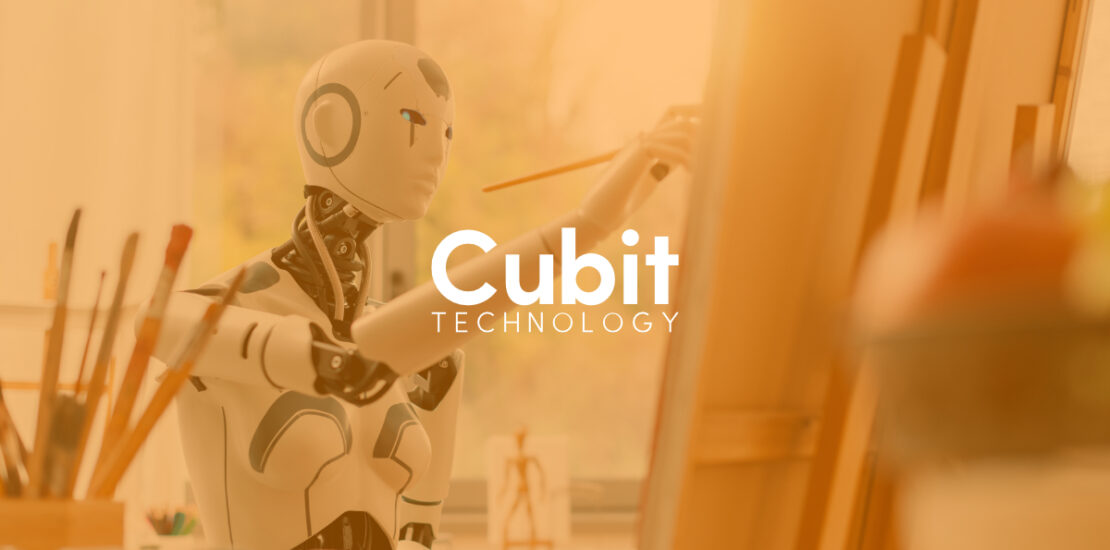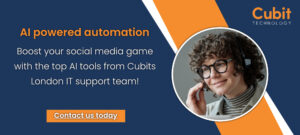Streamlining Your Marketing Workflow with AI-Powered Automation
- 1 September 2023
- Posted by:
- Category: Blogs

AI automation can streamline your business workflow
The emergence of a new generation of AI has created a range of opportunities for automation wherever you look. Whether its finance, sales, operations or leveraging your data to drive enhanced value, automation is becoming a key method for driving a razor-sharp competitive edge for businesses today. One area in particular is marketing, where AI-powered automations can save vast amounts of time while enhancing the value that businesses deliver to their audience.
In this piece, we will introduce you to the technology underpinning AI-powered automations in marketing and beyond so that you can identify useful AI-driven solutions for your business, and outline some key AI-driven tools in marketing that can streamline your marketing workflows.
What Technology Enables AI-Driven Automation?
The next generation of AI is underpinned by a handful of key technologies that make it possible to harness vast amounts of data to find intelligent solutions in real time. They are:
Machine Learning Algorithms
Machine learning is a subset of AI that allows algorithms to learn from data without being explicitly programmed. As they learn from this data to meet success criterion, they learn how to make predictions, decisions and to create correlations that can drive value for businesses. Over time, these algorithms can improve their performance as they process this data.
Cloud Computing
The computer power required to run AI and automation tools is often beyond what a single local machine can handle. Cloud computing provides scalable and flexible resources that allow these tools to process data, run complex algorithms, and deliver results efficiently. Cloud computing solutions range from the famous Microsoft 365 platform to data centres that offer vast computing services to businesses over an internet connection.
Natural Language Processing (NLP)
NLP enables automation tools to understand and process human language. With NLP, these tools can read, interpret, and respond to text or speech inputs, making them capable of performing tasks like sentiment analysis, language translation, and chatbot interactions. An example of an NLP model is ChatGPT; as of version 3.5, it operates on over 175 billion parameters!
Big Data and Data Analytics
Automation tools rely on access to large datasets to identify patterns, trends, and insights. The abundance of data available today allows AI algorithms to learn and make predictions with greater accuracy than ever before. Data analytics techniques include machine learning and natural language processing, which allow AI to extract useful information from structured and unstructured data, which in turn, enable automation tools to understand human behaviours and preferences, whether it’s on a website, e-commerce store, or app.
Now that the key technologies underpinning intelligent automation has been outlined, let’s look at some marketing examples and use cases.
Personalised Customer Experiences and Content
Imagine if you could deliver an increasingly personalised experience to your prospects and customers based on their demographics, behaviour and preferences without intensive human effort. This is what AI is doing in the realm of content creation!
AI-powered tools can analyse vast amounts of data to derive intelligent insights into your customers that can be applied to your content marketing efforts. They can examine a customer or prospects browsing history, social media activity and previous interactions with your brand to give them tailored product and content suggestions on your website. If you’re distributing emails, AI can personalise Call To Actions to that person where appropriate, increasing the chances of conversions.
An example is on websites, if a customer visits a website, it’s possible to deliver personalised product recommendations to them based on their browsing history and purchase behaviour.
Automated Social Media Management
Managing social media channels can be time-consuming, but AI automation can simplify the process for your business. AI tools can schedule and publish posts at the optimal times, analyse engagement metrics, and can even respond to customer inquiries using natural language processing. This not only drives better results but it also saves time.
A direct example is social media chatbots which can interact with customers and answer frequently asked questions while providing instant support. With a knowledge base to train the chatbot with, you can empower it to answer both routine and more complicated questions alike.
Intelligent Lead Generation and Nurturing
AI algorithms can identify potential leads and prioritise them based on their likelihood to convert. By analysing customer data and behaviour, AI can predict when a lead is ready to make a purchase and trigger automated nurturing campaigns to guide them through the sales funnel.
An example is AI-driven lead scoring where AI assigns a numerical value to each lead based on their interactions with the brand, website engagement, and demographics. This not only saves time, but it helps to direct the efforts of sales teams to the most promising leads that will convert.
Data Analysis and Insights
Analysing vast amounts of marketing data manually can be time-consuming, complex, and there’s always the risk of missing out on insights! AI-powered analytics tools can process large datasets and identify patterns and trends, enabling marketers to make data-driven decisions more quickly. It is worth mentioning that it’s important to take care of the quality of your data, as the quality of your AI depends upon it to drive valuable insights.
An example of AI that leverages Natural Language Processing, is sentiment analysis. Here, AI can be applied to scan for and analyse customer feedback across your channels, including social media platforms, to understand how prospects and customers perceive your business and its services. This can empower marketers to tailor their campaigns accordingly.
Automated Email Marketing
Email marketing is a key area where AI-driven automations are changing the game. Smart algorithms are able to segment email lists based on preferences, behaviour and demographics to deliver personalised email campaigns that strike a chord. The key benefit of this is more value to your subscribers, more click-through rates, and ultimately, conversions.
A direct example is automated drip campaigns where AI can personalise and then deliver a series of emails to prospects based on their interactions with your business. This can help to nurture leads at each stage of the customer journey and lead them towards converting.
Content Curation and Creation
There are a range of AI-driven tools that can assist marketers in creating and curating content more effectively. These tools can automate design-making, copywriting, video creating and even website design. By supporting the creative process by automating aspects of it, AI can save time and resources.
An example of this is content idea generation, where AI algorithms can analyse trending topics, search queries and customer preferences to create content ideas for your customer segments that will resonate with them.
Automated A/B Testing
AI-powered A/B testing tools can automatically test various elements of marketing campaigns, such as ad creatives, email subject lines, and landing page designs. The AI algorithms can then identify the most effective variations by verifying which ones work best with your target audience, helping your marketing team to optimise their campaigns.
Conclusion
AI-powered automation is revolutionising the marketing workflow, empowering marketers to work more efficiently and deliver better results at the same time. This technology is driven by the emergence of cloud computing, machine learning, data analytics and natural language processing technologies which enable AI to learn from vast amounts of data in real time to deliver enhanced results.
In our next pieces we will go into more detail into some application points for AI in marketing, focusing on social media, email campaigns and content creation. Stay tuned for more cutting-edge insights that will drive exponential value in your marketing efforts!
Cubit Technology – Impactful IT Support and Management for London’s Creative Sector
Nestled in the dynamic heart of Central London, Cubit Technology is your foremost destination for a wide range of IT solutions and support services. Located in the bustling city of London, our dedicated team specializes in providing IT support, management, and consultancy services designed specifically to empower businesses within London’s creative sector, including those engaged in marketing, design, and related industries. Our goal is to facilitate your growth and success by harnessing the power of technology.
At Cubit Technology, we recognize the distinctiveness of each creative business, which is why we adopt a tailored and multi-disciplinary approach. We empower creatives to flourish in diverse IT environments, whether it be on-premises, hybrid, cloud-based, or across both PC and Mac setups. Contact us today and elevate your business to new heights within the bustling metropolis of London!
